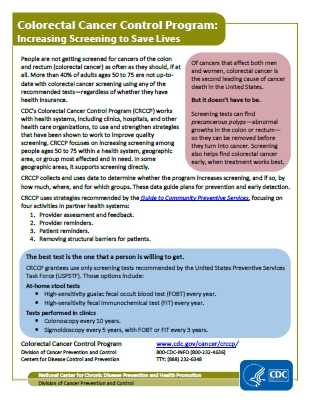About the Program
Background
Of cancers affecting both men and women, colorectal cancer (cancer of the colon and rectum) is the second leading cancer killer in the United States, but it doesn’t have to be. Screening can find precancerous polyps—abnormal growths in the colon or rectum—so they can be removed before turning into cancer. Screening also helps find colorectal cancer at an early stage, when treatment often leads to a cure.
The U.S. Preventive Services Task Force (USPSTF) recommends screening average-risk adults who are between 50 and 75 years old for colorectal cancer.
Despite strong evidence to support colorectal cancer screening, in 2012, only 65% of adults reported being up-to-date with colorectal cancer screening. Groups who are less likely to be screened include: men, Hispanics, American Indians, Alaska Natives, people who are 50 to 64 years old, those who don’t live in a city, and those with lower education and income. Lower screening rates directly contribute to higher death rates from colorectal cancer.
Purpose
The purpose of CDC’s Colorectal Cancer Control Program (CRCCP) is to increase colorectal cancer screening rates among people between 50 and 75 years of age by—
- Implementing evidence-based interventions described in the Guide to Community Preventive Services (the Community Guide) and other supporting strategies in partnership with health systems.
- Providing screening and follow-up services for a limited number of eligible people.
Program History
To better understand how to structure and implement population-level colorectal cancer screening, primarily by providing direct screening services, CDC conducted a four-year colorectal cancer screening demonstration program in five sites from 2005 through 2009. The program provided USPSTF-recommended colorectal cancer screening tests to low-income men and women who were uninsured or underinsured for colorectal cancer screening services.
Following the successes and lessons learned from the demonstration program, CDC received additional funding to support the Colorectal Cancer Control Program in 22 states and 4 tribal organizations effective fiscal year 2010. The program focused on promoting colorectal cancer screening among all people over age 50, with the goal of increasing the percentage of people who have been screened as recommended regardless of income or health insurance status. Grantees used evidence-based interventions recommended in the Community Guide to try to reach this goal. Up to 30% of awarded funds were used to provide colorectal cancer screening to low-income men and women who were uninsured or underinsured for colorectal cancer screening services.
The current program builds on lessons learned from previous iterations of the program. Previously, the program had a very broad scope, aiming to increase colorectal cancer screening rates to 80% among all age-eligible adults in the state or tribal region. The current program focuses on increasing screening in targeted populations served by partner health systems by implementing priority interventions from the Community Guide. This approach allows grantees to implement targeted activities on a feasible scale, and collect data that show the program’s impact. The CRCCP currently funds 23 states, 6 universities, and one American Indian tribe.
- Page last reviewed: August 31, 2017
- Page last updated: August 31, 2017
- Content source:
- Maintained By:


 ShareCompartir
ShareCompartir
